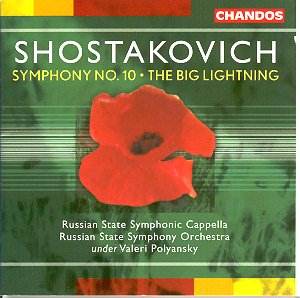Dmitri SHOSTAKOVICH (1906-75)
Symphony No. 10 in E minor, Op. 93. The Big
Lightninga.
 aVsevolod Grivnov
(tenor) Yegor/Tommie; aDmitry Fadeyev (bass) Semyon/Manager;
aOleg Dolgov (tenor) Architect; aAndrei Barurkin (bass)
Mayofel; aTatiana Sharova (soprano) Old Woman; aAnatoly
Safiulin (bass) bass solo/voice from the megaphone; Russian State
aSymphonic Cappella and Symphony Orchestra/Valeri
Polyansky.
aVsevolod Grivnov
(tenor) Yegor/Tommie; aDmitry Fadeyev (bass) Semyon/Manager;
aOleg Dolgov (tenor) Architect; aAndrei Barurkin (bass)
Mayofel; aTatiana Sharova (soprano) Old Woman; aAnatoly
Safiulin (bass) bass solo/voice from the megaphone; Russian State
aSymphonic Cappella and Symphony Orchestra/Valeri
Polyansky.
 Chandos CHAN9522 [74'14]
[DDD]
Chandos CHAN9522 [74'14]
[DDD]
Crotchet

Shostakovich's Tenth would furnish an essay entitled 'the Symphony as Cryptogram'
with enough material to threaten a rainforest. Its underlying programme has
been the subject of much conjecture. Shostakovich is quoted as suggesting
that the second movement was a portrait of Stalin. Repetitions of the composer's
musical signature, DSCH, are manifold, and there various occurrences of a
theme associated with Elmira Nazirova, who had been the composer's confidante
during 1953 (the first performance of the Tenth was on December
17th of that year). But this symphony remains one of Shostakovich's
most popular utterances precisely because of its enigmatic intensity: like
the finale of the Fifth Symphony, the end of the Tenth is by no means
conclusively triumphant.
Polyansky's reading is most successful in the extended first movement. He
understands this sprawling structure well, capturing the emotional shifts,
urging the brass to a weighty sound for the climaxes. I suspect the first
clarinettist needed no coaxing for his efforts, so natural and unforced and
yet touching do they sound.
Eric Roseberry, in his excellent notes, states that 'the concentrated fury
of Shostakovich's blistering, spitting march knows no bounds'. True enough,
but there are better ways of experiencing this fury than with Polyansky.
Mravinsky, of course, has a special place in the history of this symphony
on record (he did, after all, conduct the first performance), and provides
a truer experience in any of his recorded versions. Try the 1976 live performance
with the Leningrad Philharmonic on Melodiya 74321 25198-2, coupled (usefully
and appropriately) with the Sixth. Polyansky's performance seems to lose
impetus as it goes on: he could have goose-stepped more convincingly in the
third movement (at around 8'10), for example. The finale continues the trend,
tending towards the literal and losing thrust and direction.
The coupling is an engaging piece of Soviet slapstick: the unfinished operetta
of around 1932, The Big Lightning. The plot appears to be ('appears'
because the libretto has not survived in its entirety) set around typically
Russian propaganda about a 'good' Soviet group being sent to set the record
straight in the degenerate West. This inhabits a very different world to
the Tenth, needless to say. Shostakovich proves his wit in this piece, providing
an enjoyable procession of songs, which the soloists revel in. Particularly
affecting is Oleg Dolgov's light tenor in the Architect's Song (in which,
incidentally, Shostakovich works in a quote from Gliere's Red Poppy,
hence, presumably, the front cover of the disc). Vienna meets Leningrad in
Mayofel's Song in an unlikely but successful marriage. Look out for the musical
depiction of a telephone, also …
Polyansky can't approach a first recommendation in the Symphony: as an
alternative to the above-mentioned Mravinsky, Karajan' s late sixties account
makes a viable Western alternative (DG Galleria 429 716-2). Worthwhile,
nevertheless, for the entertainment of The Big Lightning. The recording
throughout is clear and unforced.
Colin Clarke
Performance

Recording


